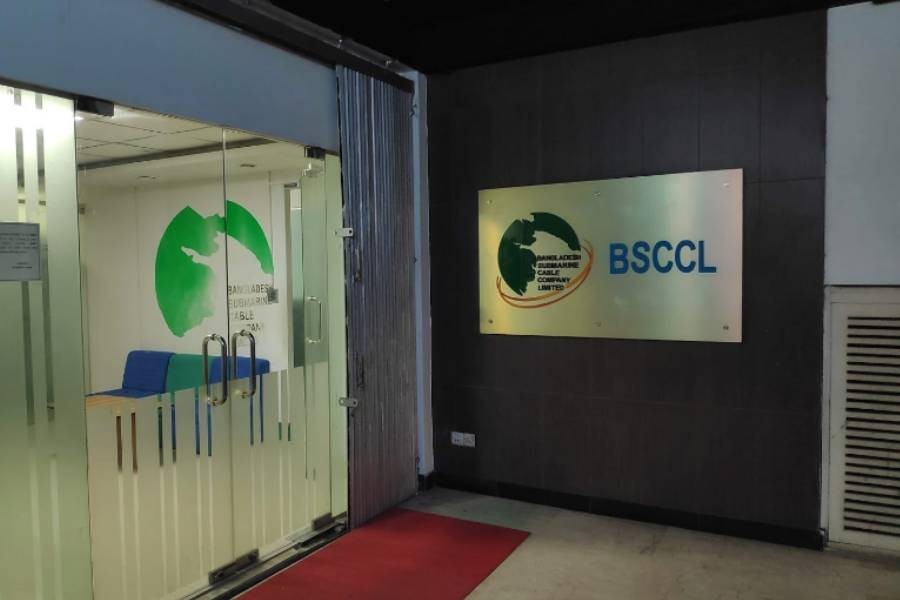Bangladesh's submarine cable company to claim downtime payment from Bharat Sanchar

Published :
Updated :

The Bangladesh Submarine Cable Company Ltd (BSCCL) is going to claim $120,000 in downtime payment from Indian state mobile service Bharat Sanchar Nigam Ltd (BSNL).
Sources said the BSNL recently paid dues to the BSCCL, but the amount fell short of $120,000 as per the account of the submarine cable company.
BSCCL managing director Mashiur Rahman said the company is going to send a letter to the BSNL demanding reconciliation of the said amount.
The BSCCL owed $754,494 from the BSNL.
The BSNL stopped payment to the BSCCL since September 2018 against its internet bandwidth import from Bangladesh.
It also deferred payments on several occasions.
For nearly a year, the BSNL has been struggling to make payments to its staff and vendors, many of whom have sought Narendra Modi's intervention to recover their dues, according to Indian media reports.
"At last, the BSNL paid its dues to the BSCCL this month," Mr Rahman told the FE.
The Indian company cited the Covid-19 pandemic as the reason behind the deferral of payment, he noted.
He said the BSNL requires to pay $120,000 as the Indian company is responsible for downtime loss at Indian end.
Downtime period cost is a period during which an equipment or machine is not functional or cannot work.
It may be due to technical failure, machine adjustment, maintenance, or unavailability of inputs such as materials, labour or power.
In June 2015, the BSNL signed a deal to import 10 gigabits per second (Gbps) bandwidth for Indian state of Tripura through Akhaura-Agartala point.
The BSCCL began exporting bandwidth to the BSNL on February 08, 2016 and continued until February 07, 2020.
In November 2019, the BSNL informed the BSCCL that it would no longer import bandwidth for a dearth of revenue despite the huge demand for internet services in the north-eastern Tripura, Meghalaya, and Assam states.
The BSNL ultimately scrapped its deal with the BSCCL on February 07, saying that it could no longer afford to import bandwidth for lack of revenue, ending a four-year partnership.
It was learnt that most Indian mobile network providers source bandwidth in remote areas from the country's heartland.
However, due to vast distances covered in hills that the bandwidth must travel, internet service level in those areas tends to be unsatisfactory.
The situation prompted Indian companies like the BSNL to import bandwidth from Bangladesh to cater to the areas closer to the border.
The BSCCL earned Tk 96 million in the first year of the agreement, with prices set at $10 per Mbps.
Later, the price was revised twice and brought down to $6.0 per Mbps.
When the deal was initially inked, the BSNL hoped to increase its bandwidth import up to 100 Gbps within a year, according to BSCCL officials.
However, the Indian company could never consume even 10 Gbps bandwidth despite huge demand in Tripura. Its consumption never exceeded 8.0 Gbps.
Under the arrangement, the BSCCL received Tk 54.6 million annually.
But the value seems rather insignificant, considering the fact that local companies here contribute around Tk 500 million in revenue to the state entity.
The BSCCL has long been holding talks with private companies of the neighbouring country. However, the discussions are yet to move towards signing formal agreements due to bottlenecks.
Currently, the BSCCL supplies about 1,100 Gbps of bandwidth to the local market while another 500 Gbps bandwidth is imported from India through Benapole.
The state-owned firm has two existing undersea cable connections-SEA-ME-WE-4 and SEA-ME-WE-5-with a combined capacity of 2,600 Gbps.
It has planned to install another (third) cable connection to meet the growing local internet demand.
The BSCCL is set to export 600 Gbps bandwidth worth $3.6 million to Saudi Telecom.
The capacity will be transferred from the western part of the core cable of the SMW-5 submarine connection to Yanbu in Saudi Arabia through Marseille in France, Mr Rahman told the FE.
The country's lone submarine cable company is also in talks with Nepal Telecom to export an estimated 100 Gbps bandwidth to that country, according to the BSCCL.
bdsmile@gmail.com


 For all latest news, follow The Financial Express Google News channel.
For all latest news, follow The Financial Express Google News channel.